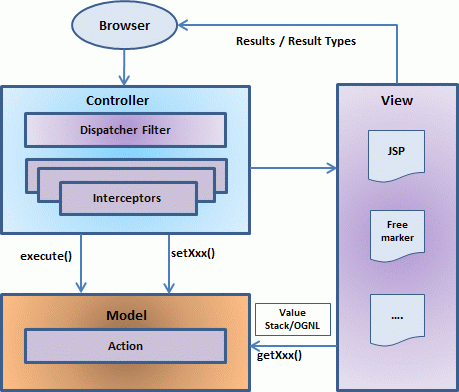
- Struts2 - Home
- Struts2 - Basic MVC Architecture
- Struts2 - Overview
- Struts2 - Environment Setup
- Struts2 - Architecture
- Struts2 - Examples
- Struts2 - Configuration
- Struts2 - Actions
- Struts2 - Interceptors
- Struts2 - Result Types
- Struts2 - Value Stack/OGNL
- Struts2 - File Uploads
- Struts2 - Database Access
- Struts2 - Sending Email
- Struts2 - Validations
- Struts2 - Localization
- Struts2 - Type Conversion
- Struts2 - Themes/Templates
- Struts2 - Exception Handling
- Struts2 - Annotations
- Struts 2 Integrations
- Struts2 - Spring
- Struts2 - Tiles
- Struts2 - Hibernate
- Struts 2 Useful Resources
- Struts2 - Questions and Answers
- Struts2 - Quick Guide
- Struts2 - Useful Resources
- Struts2 - Discussion
Struts 2 - Architecture
From a high level, Struts2 is a pull-MVC (or MVC2) framework. The Model-ViewController pattern in Struts2 is implemented with the following five core components −
- Actions
- Interceptors
- Value Stack / OGNL
- Results / Result types
- View technologies
Struts 2 is slightly different from a traditional MVC framework, where the action takes the role of the model rather than the controller, although there is some overlap.

The above diagram depicts the Model, View and Controller to the Struts2 high level architecture. The controller is implemented with a Struts2 dispatch servlet filter as well as interceptors, this model is implemented with actions, and the view is a combination of result types and results. The value stack and OGNL provides common thread, linking and enabling integration between the other components.
Apart from the above components, there will be a lot of information that relates to configuration. Configuration for the web application, as well as configuration for actions, interceptors, results, etc.
This is the architectural overview of the Struts 2 MVC pattern. We will go through each component in more detail in the subsequent chapters.
Request Life Cycle
Based on the above diagram, you can understand the work flow through user's request life cycle in Struts 2 as follows −
User sends a request to the server for requesting for some resource (i.e. pages).
The Filter Dispatcher looks at the request and then determines the appropriate Action.
Configured interceptor functionalities applies such as validation, file upload etc.
Selected action is performed based on the requested operation.
Again, configured interceptors are applied to do any post-processing if required.
Finally, the result is prepared by the view and returns the result to the user.